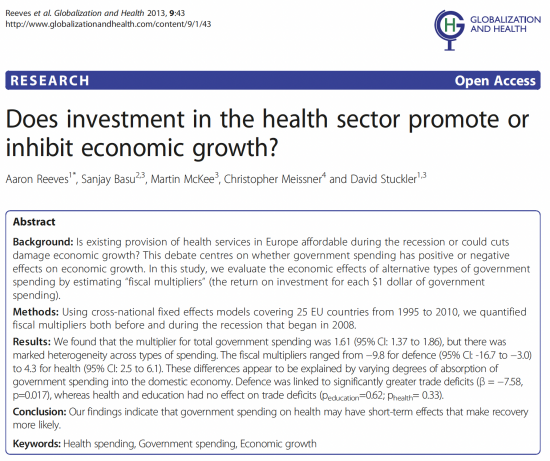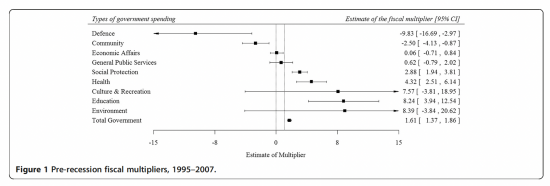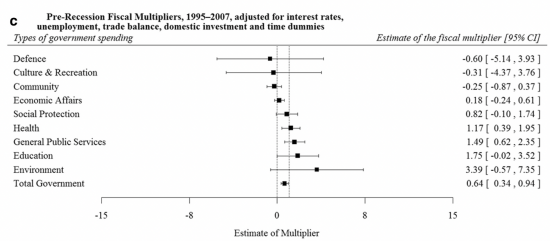The government is as adamant as ever this morning that it cannot afford to address the NHS doctor's pay dispute.
They are offering 2% when inflation has been 10%, and junior doctors have seen their pay fall by more than 25% on average over a decade. There is, I suspect, no one but health secretary Steve Barclay (and maybe his shadow, Wes Streeting) who think that is a sensible offer, but they insist it is all that can be afforded. What is more, they claim inflation will result if they concede.
Inflation cannot result. Presuming the eventual deal is no more than 10% (and I am being an optimist when suggesting that) there will be no wage spiral. What is more, the NHS does not charge for its services: there can be no price impact as a consequence. In that case, most of the government's argument falls away.
But so too does that on affordability. A 2013 paper looked at this issue in the journal Globalization and Health. This is US based. I suspect the findings very readily transfer to the UK. The question asked was whether in the post-2008 downturn extra spending on health might increase overall economic wellbeing. The short answer was that it could. This is the abstract:

The research focused on the fiscal multiplier effects of medical spending. As the authors neatly summarised the multiplier:
The fiscal multiplier is an estimate of the effect of government spending on economic growth. A multiplier greater than 1 corresponds to a positive growth stimulus (returning more than $1 for each dollar invested), whereas a multiplier less than one reflects a net loss from spending.
To summarise the findings, over a range of scenarios the authors found that this was always the case. Using unadjusted data they came up with these multipliers pre-2007:

Adjusting for a range of variables they came up with lower estimates:

The disparities are big: the paper explains them, reasonably. But the point is that in a stable environment healthcare spending pays for itself. In a recession, it is likely to yield significant positive returns. That is not true of all government spending, with defence always coming out worst.
The question is, why in that case is the government denying medics the pay rises they so obviously deserve and which society requires to be paid? Is it stupidity, spite, or some darker motive?
Thanks for reading this post.
You can share this post on social media of your choice by clicking these icons:
There are links to this blog's glossary in the above post that explain technical terms used in it. Follow them for more explanations.
You can subscribe to this blog's daily email here.
And if you would like to support this blog you can, here:


 Buy me a coffee!
Buy me a coffee!

335,000 excess deaths have resulted from the government’s austerity policies. That’s part of the reason NHS workers are striking.
It is insulting and grossly unfair that MPs will get an automatic 2.9% pay rise next year, on top of the 28% pay rise they have already received since 2010.
As we can see, austerity screws over the economy. Extra money will help boost the economy, but needs to go much further: most public sector workers need the value of their salary restored. We need to build a million more affordable houses (they built 2.5m after the war, and created the NHS). See also:
Gavin Barker, “How to Fund the NHS and Public Services“, Citizen Network, 25 May 2018. https://citizen-network.org/library/how-to-fund-the-nhs-and-public-services.html
It’s quite obvious, and has been since 1948. If I remember correctly, every Tory M.P voted against the creation of the N.H.S, So now the plan is, and has been since its inception, to destroy it, and that has been accelerated since 2010. The introduction of the Health and Social Care act in 2012 was just the first step. I’m very much afraid that future generations will never benefit from a great caring entity, that I have had at my beck and call for most of my life.
The social and moral cases of improved pay and conditions are clear. These data support the economic case.
I am pleased that the junior doctors are unapologetic in seeking restoration after 13 years of being undermined.
But the fiscal multipliers give even more support to education sector (including teachers). Their “unions” fail to present a coherent case arguing for a reasonable restoration. Many workers continue to be led by donkeys.
Very good paper – the contrast between health spending (positive multiplier) and “defense” – negative multiplier is stark. It is unfortunate that the paper does not have more traction amongst the political classes – that said, they probably deploy cognitve dissonance since the message in the paper does not fit with their programming. Interesting that defense was lined to trade deficits and yet health spending has no impact.
I am puzzled at their conclusion that health spending has no impact on the balance of payments. Many drugs and much equipment in the NHS is manufactured abroad.
I for example, have been on a drug that according to NICE costs over £3000/syringe, and I needed 4 syringes every 8 weeks. The drug is produced by a US company and shipped from the states I believe.
We also expert considerable sums
Why assume we do not?
That is true of both the US and UK
Always worth remembering that all the Tories current policies are aimed at trying to secure the votes of people that thought the policies of Liz Truss were just what they wanted. The same people that still support Johnson and Trump.
Never underestimate the power of greed, hatred and stupidity.
I think that paper has been referred to on this blog before, back in the distant days before Coronavirus. Here: https://www.taxresearch.org.uk/Blog/2018/06/25/it-really-is-time-that-people-realised-most-government-spending-pays-for-itself/
Much of that discussion remains just as relevant nearly five years later.
Good ideas and papers can always be used twice
(Sorry, I thought I had posted this earlier, and apologies if I now do so twice.)
Of course. And it is particularly relevant this week.
We are about 10 years on from its publication so there may be some later supporting research.
Worth reflecting that this research has existed for a decade but the terms of debate do not appear to have moved on at all.
Perhaps it will take as long to correct the course of the neoliberal supertanker as it took to out it on that course in the first place. The IEA was founded in 1955 to shift opinions, but the postwar consensus remained more or less in place for almost another generation until 1980. And we are now a generation and a half along from that. Is it time for the wind to change direction?
You did an earlier different version
This was worth saying as well
Ian Tresman is right to mention our bastard MPs whose salary has risen exponentially since 2010 – no doubt in my mind as a response to being caught out in the expenses scandal. It’s good to have a job in the seat of power isn’t it? Tossers!
https://www.thelondoneconomic.com/politics/mps-get-8-pay-rises-in-10-years-while-nurses-salaries-are-slashed-197695/
What I can’t get my head around is that when I like many civil servant grade public sector workers got a backdated rise in November 2022, is just how much of it got claimed back by the government through the PAYE system in tax and NI contributions.
I mean it has benefits all round – for the funder and the employed AND patients!!
What is so hard for the government to understand about that?
Well it can only be a deliberate act to ignore the benefits aimed at creating gaps that can be exploited by private providers using private investment to drive their expansion into those gaps.
Privatisation and rentier-ism in other words. The health service is being sacrificed as a means of of providing a portfolio of investment spreads to help the rich preserve their wealth.
That’s how I see it.
I read somewhere that for every £1 spent by the government, 98% gets taxed back. Eventually.
As this data implies
PSR, that londoneconomic article you referenced said that the government promised all starting salaries for newly qualified teachers would be a minimum of £30,000 in the year 2022-23. It is now £28,000. They lied.
They lied. I guess we shouldn’t be surprised. But good that you highlight it…….
What is shocking is that the folk who are supposed to monitor/track/petition for pay and conditions aren’t getting their message across (to their members, the public, the media). And the so-called opposition remove the whip from those who complain about working pay and conditions – and fail to demonstrate any leadership in showing there is a better way of living, or controlling the economic instruments and levers to have a different outcome. The BMA is being criticised by the tories for pointing out how big the gulf has become. Other public service workers being let down by their representatives.
Increasingly, I think the issue isn’t the tories (they aren’t going to help) … it’s the donkeys that take the role of representing the vast majority of the population — but neglect their duties. Meantime, the left behind and dis-enfranchised, in absence of a better way forward, are descending along the path of 1930’s autocracies….
You may be right
I’ve worked in the NHS for over 20 years. This is nothing more than ideology driving deliberate decline, aided and abetted by journalistic failure/ collaboration and a pervasive view in society that all doctors are overpaid and spend 3 days on the golf course (because obviously all doctors are white, male, 50+) etc.
Agreed
That is the problem
And that narrative is crass
What has not been highlighted sufficiently in my view by the BMA is the impact of starting with £100,000 debt on which interest rates are soaring. A double whammy that most people do not have as even if graduates their debt is significantly less.
Also, as any organisation begins to crack up, it becomes prey to a feeding frenzy of expensive management consultants to deal with the firefighting in constant crisis.
I am hearing from consulting colleagues that this boom time is in full swing.
As you say , governments cant resist reoganising and re-managing the NHS
https://lowdownnhs.info/explainers/nhs-reorganisation-a-never-ending-story/
Each one seems to have provided further pickings not only for expensive consultants – but also for those seeking more private pickings, more marketisation and further eroding its public ethos
One could be forgiven for wondering if this is all a deliberate ploy aimed at demonstrating their anti-union anti-public service cojones during the run up to an election. Or at finishing off the NHS before a new government can come in and try to retrieve the situation.
https://weownit.org.uk/act-now/rebuild-our-nhs
I imagine we will be discussing it at lunchtime tomorrow, along with taking the buses back into public ownership and renationalising water and the railways.
So much to do.
Havent really studied it fully – but does the private health care system in the US , making it far more expensive, have an effect on the difference between the multiplier effect in UK and US.
Why?
This article encouraged me to check inflation calculators to see how I’ve done over the last 20 years.
The verdict: I’m £3000 up and that, from this month, will be taxed at 62%. But at least, I’m ahead, just, and I earn a good deal more than average.
That said, I doubt that whatever is left will cover the increases in essential things like food, gas, electricity, transport, etc.
I really cannot blame “junior” doctors for striking. And I’m old enough to have no student debt to pay off whatsoever.
It is very hard to avoid the conclusion that the piss is seriously being taken out of anyone who works for a living.
And even harder to avoid the conclusion that the electorate is collectively as thick as mince.
Thanks
Grum, you’ve said you “earn a good deal more than average” … And may yet experience a drop in living standards. The dice are biased / the levers are being increasingly tweaked to the benefit of a smaller subset of the rentiers.
I don’t know that the electorate are more “thick” … Complacent? yes! The young (traditionally more activist) are enduring huge discrimination by the old …. But (see earlier) … It’s possibly not stupidity .. is it not a vacuum of opposition/leadership of an alternative?
Ex-teach,
I suspect that you and I are exactly the same page regarding who’s interests things are being run.
Regarding the electorate though, I could understand complacent if things had remained comparatively stable over the last couple of decades, but since this is obviously not the case and we see a massive transfer of value away from working people, and still they vote in favour of this, then I think some sort of cognitive failure is a reasonable conclusion.
Hopefully the encouraging increase in views of Richard’s excellent blog is a sign that people might be waking up and smelling the coffee.
progressive pulse article from 2013….worth a read………
http://www.progressivepulse.org/economics/is-world-leading-nhs-healthcare-an-affordable-proposition
sorry…that should have read 2017…
A very brave doctor here, who obviously thinks she has little to lose by writing this.
https://www.opendemocracy.net/en/nhs-junior-doctor-strikes-are-about-desperation/
Most people who write articles like this are anonymous.
https://www.doctorsforthenhs.org.uk/wp-content/uploads/2023/04/DFNHS-April-23.pdf
A long read. Link from today’s weownit.